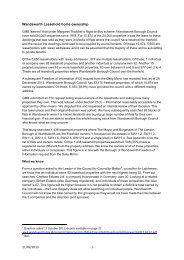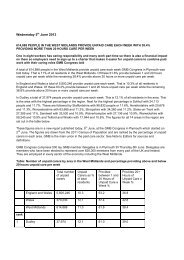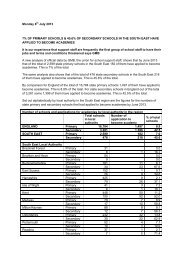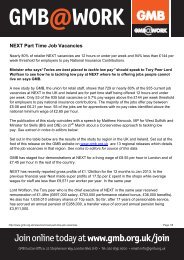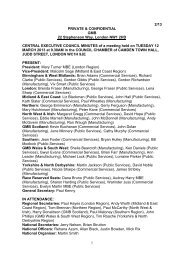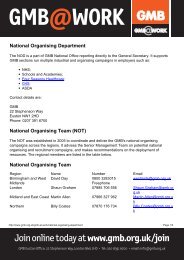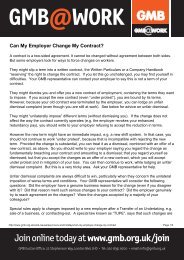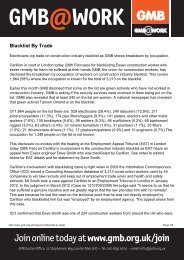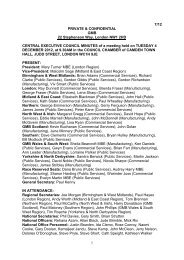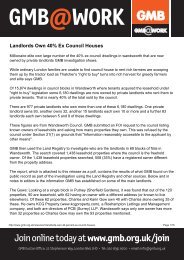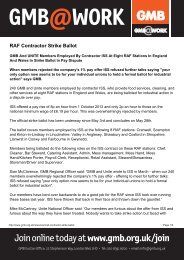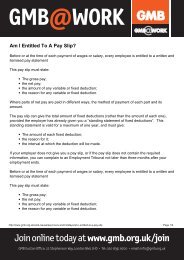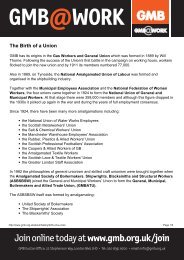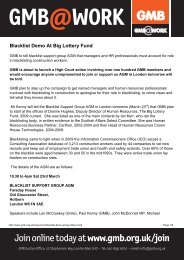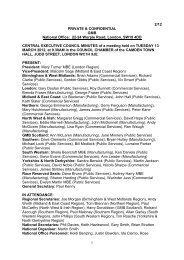WO toolkit 2012 complete.pdf - GMB
WO toolkit 2012 complete.pdf - GMB
WO toolkit 2012 complete.pdf - GMB
You also want an ePaper? Increase the reach of your titles
YUMPU automatically turns print PDFs into web optimized ePapers that Google loves.
SECTION 4.2<br />
THE LAW ON REPRESENTING INDIVIDUAL MEMBERS<br />
The law now provides minimum rights to all workers to have proper representation under an agreed<br />
procedure when facing a disciplinary hearing or lodging a grievance.<br />
RIGHT TO BE ACCOMPANIED FOR ALL <strong>WO</strong>RKERS<br />
This is covered in section 10 of the 1999 Employment Rights Act and gives all workers the right to be<br />
accompanied to any disciplinary or grievance hearing by a union representative or‘companion’.This law<br />
does not mean <strong>GMB</strong> is required by law to represent any worker who asks us for help,(see section 1.4).<br />
THE LAW ON DISCIPLINARY AND GRIEVANCE PROCEDURES<br />
It is a fundamental principle of trade unionism that everyone should have the same rights at work and<br />
faces the same sanctions,with the employer following the same laid down procedure.It is impossible to<br />
have a fair system if the rules are not written down somewhere and understood.<strong>GMB</strong> has argued for<br />
decades that it is essential that written procedures exist for individual problems,otherwise<br />
management will be free to operate their own unaccountable system of shop floor‘justice’.<br />
The 2002 Employment Act ensures every employer has to have a written procedure and to tell their<br />
workforce what it is.<br />
As part of the 2002 Employment Act,ACAS has produced a minimum procedure that all employers must<br />
adopt.<strong>GMB</strong> policy is to make sure that we improve on this procedure in workplaces where we have<br />
members.<br />
Every employer must have at least the following procedures,which must be written down and<br />
published:<br />
STANDARD DISCIPLINARY PROCEDURE<br />
Step one–Written Statement: A written statement of the employee’s alleged conduct sent to the<br />
employee<br />
Step two–Disciplinary Meeting: The date if this meeting must be notified to the employee with at<br />
least five working days notice.The employee should be advised of their right to representation and the<br />
findings of the meeting should be notified to the employee with advice on their right to appeal.<br />
Step three–Appeal: The employee must notify the employer of their wish to appeal.The appeal<br />
meeting must be held in reasonable time and preferably with a more senior manager present.The<br />
employee must be notified of the decision soon after the meeting.<br />
Note:<br />
In the event of instant dismissal due to alleged gross misconduct,step two can be missed.<br />
STANDARD GRIEVANCE PROCEDURE<br />
Step one–Written Statement: The <strong>GMB</strong> member must set out their grievance in writing and send it to<br />
the employer.<br />
Step two–Grievance Meeting: After a reasonable time has passed,the employer must call a meeting to<br />
discuss the grievance.Employees have the right to be accompanied at this meeting.After the meeting,<br />
the employer must advise the employee of the decision and of their right to appeal.<br />
Step three–Appeal: The employer must invite the employee to a further meeting to discuss their<br />
appeal and this meeting should be attended by a more senior manager.After the meeting the employer<br />
must inform the employee of their decision.



